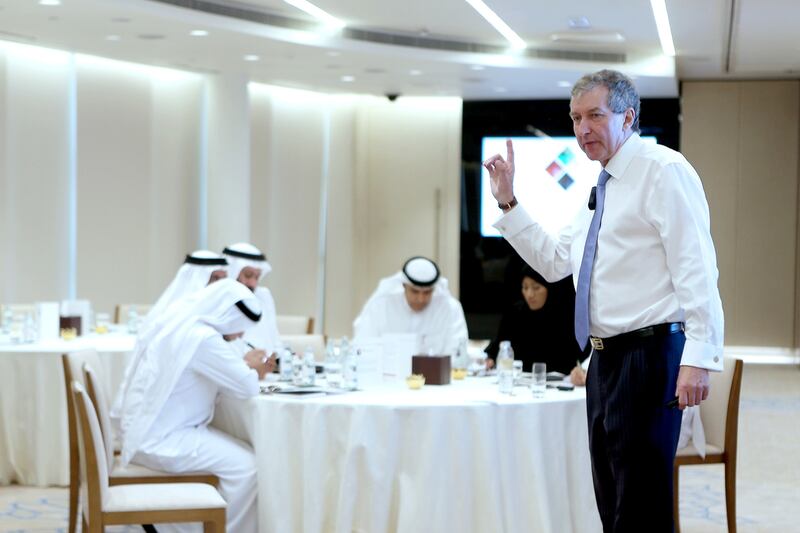Chris Roebuck is professor of transformational leadership at Cass Business School in Dubai and London. After serving for six years as an officer in the British Army, he went on to hold senior roles at UBS, HSBC and KPMG before becoming a human resources researcher and adviser. Here Mr Roebuck, who spoke at the Gov HR Summit 2015 – for professionals working in government, semi-government and public sectors across the GCC – in October, discusses a leadership workshop he recently conducted for the prime minister’s office:
What did the leadership programme for the prime minister’s office involve?
I led a workshop for alumni of the UAE Government Leaders Programme, which explored the current challenges being faced in delivering the best services to citizens and building a legacy for future generations. The key to success for government is growing leaders who inspire their people to excel, and then focus on what will deliver the best service and future for the nation.
What is the alumni of government leaders?
This includes all those from the government who have attended the UAE Government Leaders Programme, which aims to build and develop leaders of the future in collaboration with global institutions. The room was filled with key corporate and government heads, and those present gave examples of inspirational leaders they had worked for and how their example could be shared and embedded across government to inspire others.
What happened during the workshop?
We discussed the challenges faced by the leaders in the room, while exploring what motivates them to give their best. We then explored the evidence effective leadership can inspire 30 per cent more effort from 60 per cent of people and the impact this can have on organisational success. We then looked at how everyone there could deliver this enhanced leadership through simple daily actions. There were no traditional leadership development models used, just the leaders’ own experience of what works and what doesn’t in the real world.
Can you give an example of a challenge tackled during the workshop?
We addressed the challenge of ensuring strategy and vision filters down from the top to bottom in any organisation. Too often those at the top understand the vision and are inspired by it as they can relate to it, but as you move further down any organisation, people often are only told to do their job and fail to see how they contribute to that vision. This reduces their motivation, which limits the chances of success. Explaining how an individual’s work contributes to the big picture can encourage over 30 per cent of additional effort, so this is a significant issue. The solution suggested was the use of regular team discussions at all levels where the leader explains this and that there is a managed cascade of key information from the top to the bottom of the organisation. It is not large change initiatives that can transform organisations, every leader doing small things on a daily basis that inspires people can actually have more impact, such as asking for their team’s ideas and suggestions.
How is the UAE Government Leaders Programme different from a traditional leadership workshop?
The alumni of the UAE Government Leaders Programme plays a critical role in the UAE’s strategic plans as they seek to make the country a world leader in public service and business, creating a platform for future generations to build upon. Therefore, this longer-term big picture thinking differs from many commercial organisations, as it is about the greater good, requiring a different leadership mindset.
Does your military training change your leadership training approach?
Military training stresses the importance of the team, as this is the critical vehicle for successful delivery. Trust is obviously critical when a team member may rely upon the actions of colleagues, with their own life at stake. In a military situation, the team is totally aligned with delivering the objective. Everyone has complete clarity about their role and what’s expected of them, which means the chances of success are optimised. Of course the consequences of failure may be higher while on an army operation. However, a fully committed trust-based approach like this should be a goal of all organisations.
Who is the most inspirational leader in history?
In recent times the example to all was Nelson Mandela. A leader of great vision, passion, insight and ability to inspire, yet balanced with humility and the capacity to see the viewpoint of others. Mandela took time to engage with ordinary people as well as presidents and statesmen. And of course the ability to forgive those who had imprisoned him, to help build a new nation.
What are your tips for practicing transformational leadership?
Use simple day-to-day leadership that inspires people. It is often the simple things like asking for ideas, letting people get on with their job and showing you care that help the journey to success. The next step is to foster entrepreneurialism and innovation while focusing on the factors that are crucial for success.
business@thenational.ae
Follow The National's Business section on Twitter





